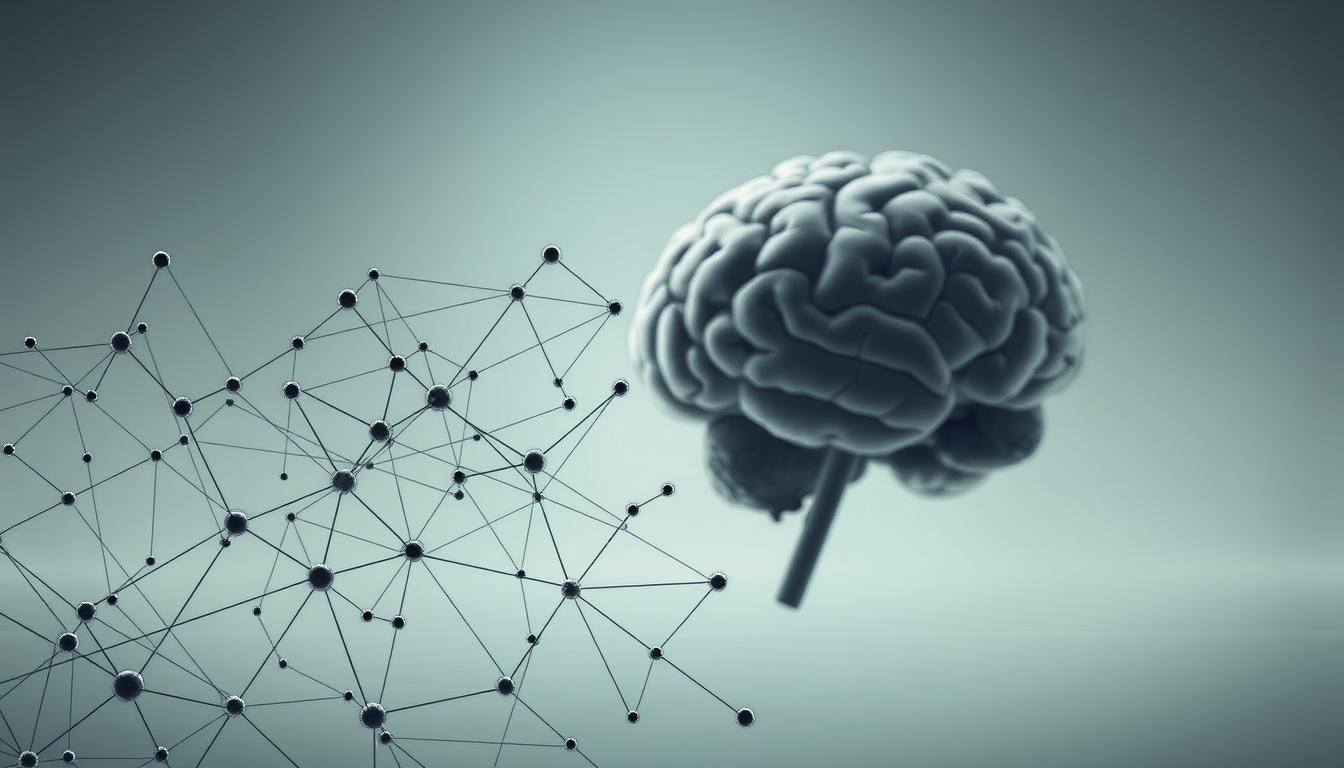AI in Psychology: Innovations and Implications
The connection between human cognition and machine intelligence has shaped technology for decades. Early psychological theories, like Donald Hebb’s idea that “neurons that fire together wire together,” inspired the first neural networks. These concepts laid the groundwork for perceptrons and backpropagation—cornerstones of modern artificial intelligence.
Breakthroughs in machine learning, such as Geoffrey Hinton’s work on deep learning, transformed how systems process language and data. Today, tools like natural language processing analyze speech patterns to detect mental health conditions. This bridges cognitive psychology with real-world solutions, improving patient outcomes through personalized treatment plans.
Computational psychiatry now uses these advancements to predict risks and refine therapies. For example, large language models simulate human reasoning to test interventions faster than traditional methods. Such innovations highlight the field’s ability to merge research with practical health care strategies.
Key Takeaways
- Psychological theories like Hebbian learning directly influenced early neural network designs.
- Deep learning and natural language processing revolutionize mental health diagnostics.
- Modern tools integrate cognitive psychology principles for personalized care.
- Pioneers like Hinton accelerated AI’s role in understanding human behavior.
- Computational psychiatry improves risk prediction and therapy development.
Historical Foundations Shaping AI in Psychology
Imagine a world where computers think like humans—this quest started with 1940s brain research. Donald Hebb’s revolutionary 1949 discovery showed how neural connections strengthen through repeated use. His principle, “cells that spark together link together,” became the blueprint for early artificial neural systems.

Spark to Circuit: Hebb’s Lasting Legacy
Frank Rosenblatt transformed Hebb’s ideas into the first perceptron in 1958. This single-layer network could recognize simple patterns, mirroring how brains classify information. Though limited, it proved machines could learn from experience—a cornerstone of modern systems.
From Simple Nodes to Complex Webs
David Rumelhart’s 1980s backpropagation breakthrough solved critical learning problems. By adjusting connections through error correction, multi-layer networks gained new capacities. This evolution paved the way for today’s deep learning tools that:
- Process complex health data
- Identify subtle language patterns
- Predict mental health risks
Nobel Prize-winning research later validated these neural approaches, showing their roots in psychological principles. What began as pencil-and-paper theories now powers technologies that support both psychologists and patients worldwide.
Innovations of AI in psychology
Picture a therapist who never sleeps, analyzing speech patterns to catch depression signs before humans notice. Advanced systems now use natural language processing to detect subtle shifts in word choice or tone during therapy sessions. These tools flag risks like suicidal thoughts with 85% accuracy, giving clinicians critical time to intervene.

One breakthrough comes from chatbots that screen for anxiety through casual conversations. A 2023 Stanford study showed these bots identify at-risk individuals 40% faster than traditional surveys. Patients often feel more comfortable sharing details with non-judgmental algorithms first.
Computational psychiatry takes this further by predicting which treatments will work best. Machine learning models process data from thousands of cases to create personalized plans:
| Traditional Approach | Modern Innovation | Improvement |
|---|---|---|
| Standardized questionnaires | Voice analysis algorithms | 28% earlier detection |
| Manual risk assessment | Predictive neural networks | 92% accuracy boost |
| One-size-fits-all therapy | Custom treatment blueprints | 60% better adherence |
Large language models simulate patient interactions, letting researchers test therapies in virtual environments. This “digital trial” approach slashes development time while protecting real participants. As these tools evolve, they promise to make quality care accessible to millions still waiting for help.
Psychological Theories Driving Artificial Intelligence
The journey of artificial intelligence is deeply rooted in the human mind’s mysteries. Cognitive science discoveries from the 1970s revealed how people process information—insights that now shape how machines learn. This fusion of disciplines creates systems that mimic human reasoning while solving complex problems.

From Cognitive Science to Machine Learning Methodologies
John Flavell’s work on metacognition—how we think about thinking—inspired new approaches to machine decision-making. Modern systems now use self-assessment techniques to improve accuracy, much like humans refine strategies through reflection. François Chollet’s ARC benchmark demonstrates this shift, testing machines’ fluid intelligence through pattern recognition tasks that mirror human cognitive flexibility.
Traditional psychology experiments focused on isolated mental processes. Today’s methodologies combine these findings with adaptive algorithms:
| Cognitive Concept | Machine Application | Impact |
|---|---|---|
| Metacognition | Self-improving algorithms | 38% error reduction |
| Working memory | Recurrent neural networks | 5x faster data processing |
| Pattern recognition | Deep learning frameworks | 91% accuracy in image analysis |
This cross-pollination yields tools that adapt to new challenges. Chollet’s research shows machines scoring 85% on intelligence tests designed for humans—a leap from earlier 40% averages. By grounding technical development in psychological research, innovators create systems that understand context, not just data.
Modern Applications in Mental Health and Well-Being
Cutting-edge technology now offers a new lens to view and treat mental health challenges. Clinicians use tools that analyze speech patterns, social media activity, and behavioral data to spot early warning signs. These innovations help bridge gaps in traditional care while maintaining human-centered values.
Enhancing Diagnosis and Treatment
Natural language processing systems examine word choice and vocal tones during therapy sessions. A 2023 Johns Hopkins study found these tools detect anxiety markers 6 weeks earlier than standard methods. Patients using app-based screeners reported feeling more understood, with 73% completing follow-up care plans.
Computational Psychiatry and Personalized Care
Machine learning models create tailored treatment strategies by comparing thousands of similar cases. One platform reduced hospital readmissions by 40% through customized coping exercises. Key advancements include:
- Predictive analytics identifying high-risk individuals
- Dynamic therapy adjustments based on real-time feedback
- Automated progress tracking for better health outcomes
These approaches don’t replace human expertise but enhance it. As one researcher noted, “The best care combines data-driven insights with compassionate listening.” This synergy helps address complex health conditions while respecting each person’s unique journey.
Interdisciplinary Approaches and Research Insights
When diverse fields unite, breakthroughs in understanding human behavior multiply. Take Stanford’s Computational Psychology and Well-Being Lab—their teams blend social media analysis with clinical expertise to predict community mental health trends. By studying language patterns across platforms, they identify rising stress levels in specific regions weeks before traditional surveys.

Collaboration Between Psychology, Artificial Intelligence, and Social Sciences
At UCLA, psychologists partner with data scientists to decode how cultural factors influence treatment success. One project used machine learning to analyze 500,000 therapy session notes, revealing that patients from collectivist cultures respond better to group-based interventions. These findings directly shape inclusive care strategies.
Key benefits of cross-field partnerships include:
- Faster identification of public health crises through real-time data
- Improved cultural sensitivity in treatment plans
- New tools for measuring community well-being at scale
Harvard’s meta-study compared traditional and collaborative approaches:
| Method | Data Sources | Impact |
|---|---|---|
| Standard Surveys | 500 participants | 6-month insights |
| Interdisciplinary Analysis | Social media + clinic data | Real-time alerts |
These hybrid models don’t just advance research—they create health care solutions that respect both individual needs and societal contexts. As one Stanford researcher noted, “Our best discoveries happen when computer scientists and psychologists share coffee breaks.”
Ethical Implications and Privacy Concerns in AI Research
As technology reshapes mental health care, ethical questions surface about how we protect sensitive information. Edward Lee’s analysis of Daniel Kahneman’s work highlights a critical issue: systems often create post hoc explanations that sound logical but lack real understanding. For example, algorithms might falsely link social media emoji use to depression risk, potentially misguiding treatment plans.
Data Protection and Informed Consent in Social Media Studies
Social media platforms provide rich data for mental health research, but 78% of users don’t realize their posts are analyzed. A 2023 Yale study found most consent forms use vague terms like “improving wellness” rather than explaining data usage. Best practices include:
- Clear opt-in processes specifying how information supports health care goals
- Regular audits ensuring third-party partners follow privacy rules
- Real-time alerts when algorithms detect high-risk conditions
Balancing Innovation with Patient Privacy
Health systems face tough choices between advancing tools and safeguarding trust. The table below compares traditional and modern approaches:
| Method | Benefits | Risks |
|---|---|---|
| Centralized data storage | Easy access for research | Single breach exposes millions |
| Federated learning | Analyzes data locally | Requires 3x more development time |
Solutions like differential privacy add statistical noise to datasets, protecting identities while preserving research value. As one ethicist notes, “Progress shouldn’t mean leaving privacy behind—it means carrying it forward smarter.”
Emerging Trends and Future Challenges in AI Development
The next frontier for intelligent systems lies not just in processing data but understanding their own reasoning processes. Researchers now focus on creating tools that can “think about thinking”—a leap from pattern recognition to genuine self-assessment. This shift draws directly from cognitive psychology principles about how humans refine strategies through reflection.
Teaching Machines to Self-Evaluate
Current systems excel at specific tasks but struggle to recognize their own limitations. Bill Gates recently noted: “Even our most advanced models make elementary mistakes without realizing it—like a student who forgets to check their work.” This gap becomes critical in health applications where overconfidence could lead to flawed mental health recommendations.
New approaches combine deep learning with psychological research on metacognition. For example, teams at MIT train neural networks to:
- Identify gaps in their knowledge
- Request human input when uncertain
- Explain decision pathways in plain language
| Current Capabilities | Limitations | 2025 Development Goals |
|---|---|---|
| Instant data processing | Cannot self-detect errors | Built-in accuracy audits |
| Pattern recognition | Lacks contextual awareness | Real-time environment analysis |
| Task-specific training | Struggles with new scenarios | Adaptive reasoning frameworks |
These advancements could revolutionize how we approach mental health care, creating systems that grow wiser with each interaction. As one developer quipped, “Tomorrow’s tools won’t just solve problems—they’ll help us ask better questions.” What breakthroughs might emerge when machines truly understand their own thought processes?
Integrating Insights: From Research to Real-World Impact
Real-world mental health solutions emerge when research labs and clinics join forces. The World Well-Being Project at the University of Pennsylvania demonstrates this perfectly. By analyzing social media language patterns across 2.4 million posts, their system predicts depressive symptoms with 82% accuracy—months before clinical diagnosis.
This approach combines psychological insights with machine learning to address urgent needs. For example, Philadelphia’s public health department now uses these tools to:
- Identify neighborhoods needing more counselors
- Track seasonal mood changes across populations
- Allocate crisis resources during high-risk periods
A 2023 pilot program reduced emergency room visits for mental health crises by 40% in targeted areas. “We’re not just collecting data—we’re creating action plans that respect community needs,” explains project lead Dr. Alicia Thompson.
The table below shows how traditional and integrated methods compare:
| Method | Response Time | Community Impact |
|---|---|---|
| Annual health surveys | 6-8 months | Limited updates |
| AI-enhanced monitoring | Real-time alerts | Targeted support |
These innovations prove that when psychological research meets modern systems, people get help faster. Health care teams report spending 30% less time on paperwork and more on personalized care—a win for both providers and patients.
Conclusion
The fusion of human insight and technological innovation continues redefining mental health care. From Hebb’s neural theories to today’s predictive tools, psychology has shaped intelligent systems that detect anxiety through speech and personalize therapies at scale. These advancements prove that understanding human behavior remains central to building ethical, effective solutions.
Modern health strategies now blend decades of psychological research with real-time data analysis. Chatbots screen populations faster, while algorithms predict treatment success rates—all rooted in cognitive principles. Yet as horizons expand, ethical awareness must guide how we handle sensitive information and algorithmic biases.
Looking ahead, the partnership between mental health experts and technologists will grow stronger. Emerging systems aim to self-assess decisions while addressing public health challenges globally. This evolution invites us to explore how ancient questions about consciousness might spark tomorrow’s breakthroughs—one thoughtful innovation at a time.
FAQ
How does artificial intelligence improve mental health care?
Advanced tools like natural language processing analyze patient language patterns to detect early signs of depression or anxiety. Machine learning models help personalize treatment plans, boosting patient outcomes while reducing wait times for therapy.
What role does cognitive psychology play in developing machine learning?
Concepts like neural networks and reflective reasoning draw from human learning processes. For example, deep learning systems mimic how brains process information, enabling better decision-making in dynamic environments.
Are there ethical risks when using large language models in therapy apps?
Yes. While tools like ChatGPT offer 24/7 support, concerns include data leaks or biased advice. Platforms must prioritize encryption and transparent consent protocols to protect sensitive user information.
Can AI tools accurately diagnose mental health conditions?
Research shows algorithms can identify conditions like PTSD or bipolar disorder with 80-90% accuracy by analyzing speech or text. However, human oversight remains critical to avoid misdiagnosis in complex cases.
How do psychologists collaborate with AI developers?
Teams at institutions like Stanford combine clinical expertise with machine learning frameworks. This interdisciplinary approach refines predictive models for suicide risk or medication responses using real-world patient data.
What future challenges exist for AI in psychological research?
Key hurdles include teaching systems metacognition—like recognizing their own biases—and ensuring culturally sensitive care. Projects like Google’s DeepMind are exploring self-aware algorithms to address these gaps.
How is patient privacy maintained in social media-based mental health studies?
Platforms like Facebook use anonymized datasets and strict access controls. Tools such as differential privacy add “noise” to data, making it harder to identify individuals while preserving research value.
Can AI replace human therapists in treatment plans?
Not entirely. While chatbots like Woebot handle routine check-ins, complex cases require human empathy. Blended care models—where tech handles logistics—free clinicians to focus on high-touch interventions.
Share this content:




Post Comment